Ecv deficit symptoms - Study guides, Class notes & Summaries
Looking for the best study guides, study notes and summaries about Ecv deficit symptoms? On this page you'll find 38 study documents about Ecv deficit symptoms.
Page 4 out of 38 results
Sort by
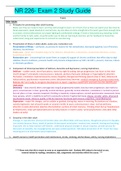
-
NR 226- Exam 2 Study Guide
- Exam (elaborations) • 9 pages • 2023
-
- $17.99
- + learn more
NR 226- Exam 2 Study Guide *** Please note that this is meant to serve as an augmentation tool. Students ARE subject to be tested on any material related to readings, simulations, labs, assignments and activities within the course. *** Topics Older Adults 1. Principles for promoting older adult learning Make sure they are ready to learn; are they well enough to learn; sit in front of pt so they can watch your lips move & facial expression; speak slowly & in normal tone; say one idea at ...
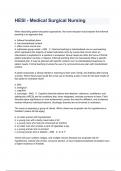
-
HESI - Medical Surgical Nursing
- Exam (elaborations) • 53 pages • 2023
- Available in package deal
-
- $14.49
- + learn more
HESI - Medical Surgical Nursing When describing patient education approaches, the nurse educator would explain that informal teaching is an approach that a. follows formalized plans b. has standardized content c. often occurs one-to-one d. addresses group needs - ANS C. Informal teaching is individualized one on one teaching which represents the majority of patient education done by nurses that occurs when an intervention is explained or a question is answered. Group needs are often...
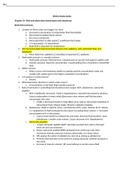
-
: Fluid and electrolyte homeostasis and imbalances
- Exam (elaborations) • 13 pages • 2023
-
- $11.99
- + learn more
: Fluid and electrolyte homeostasis and imbalances Body fluid summary 1. Location of thirst center and triggers for thirst a. Increased concentration of extracellular fluid (Osmolality) b. Decreased circulation blood volume c. Dry mucus membrane d. Decreased thirst in older adults insufficient fluid intake e. 2/3 intracellular 1/3 extracellular f. Body fluid is important for temperature 2. Normal homeostatic fluid movement between the capillaries, cells, interstitial fluid, and lymp...
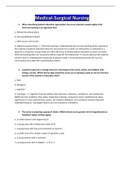
-
Medical-Surgical Nursing
- Exam (elaborations) • 51 pages • 2023
-
- $9.49
- + learn more
Medical-Surgical Nursing 1. When describing patient education approaches, the nurse educator would explain that informal teaching is an approach that a. follows formalized plans b. has standardized content c. often occurs one-to-one d. addresses group needs - C. Informal teaching is individualized one on one teaching which represents the majority of patient education done by nurses that occurs when an intervention is explained or a question is answered. Group needs are often the focus of fo...
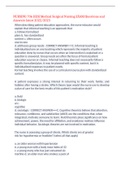
-
NURSING 706 HESI Medical Surgical Nursing EXAM Questions and Answers latest 2022/2023,100% CORRECT 100% CORRECT
- Exam (elaborations) • 106 pages • 2023
-
- $16.99
- + learn more
NURSING 706 HESI Medical Surgical Nursing EXAM Questions and Answers latest 2022/2023 When describing patient education approaches, the nurse educator would explain that informal teaching is an approach that a. follows formalized plans b. has standardized content c. often occurs one-to-one d. addresses group needs - CORRECT ANSWER===C. Informal teaching is individualized one on one teaching which represents the majority of patient education done by nurses that occurs when an intervention is e...
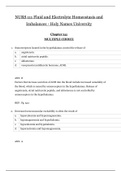
-
NURS 111 Fluid and Electrolyte Homeostasis and Imbalances - Holy Names University | NURS111 Fluid and Electrolyte Homeostasis and Imbalances - 2020
- Exam (elaborations) • 27 pages • 2021
- Available in package deal
-
- $17.99
- + learn more
NURS 111 Fluid and Electrolyte Homeostasis and Imbalances - Holy Names University Chapter 24: MULTIPLE CHOICE 1. Osmoreceptors located in the hypothalamus control the release of a. angiotensin. b. atrial natriuretic peptide. c. aldosterone. d. vasopressin (antidiuretic hormone, ADH). 2. Decreased neuromuscular excitability is often the result of a. hypercalcemia and hypermagnesemia. b. hypomagnesemia and hyperkalemia. c. hypocalcemia and hypokalemia. d. hypernatre...
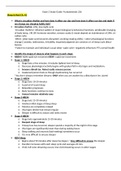
-
NR 226 Exam 2 Study Guide- Fundamentals 226/ Download To Score A.
- Other • 19 pages • 2021
-
- $10.99
- + learn more
Exam 2 Study Guide- Fundamentals 226 Sleep & Rest Ch. 42 What is circadian rhythm and how does it affect our day and how does it affect our day and night if we change our sleeping habits/job? • Circadian rhythm: 24hr, day/night cycle -Circadian rhythms= influence pattern of major biological & behavioral functions; predictable changing of body temp., HR, BP, hormone secretion, sensory acuity & mood depend on maintenance of 24hr. cir- cadian cycle. -When sleep-wake cycle becomes disrupted ( wor...
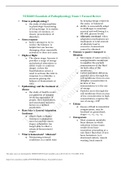
-
NUR 2063 / NUR2063: Essentials of Pathophysiology Exam 1 Review Study Guide (Latest 2021) Rasmussen
- Exam (elaborations) • 9 pages • 2021
-
- $10.99
- + learn more
NUR2603 Essentials of Pathophysiology Exam 1 Focused Review • What is pathophysiology? o the study of abnormalities in physiologic functioning of living beings. It is studies in terms of common , or classic, presentations of disorders. • Stress response o body’s attempt to try to restore the balance; is helpful but can become damaging when repeatedly activated or does not cease. • Flight or flight o The alarm stage; because it provides a surge of energy and physical alterations to either...

Did you know that on average a seller on Stuvia earns $82 per month selling study resources? Hmm, hint, hint. Discover all about earning on Stuvia


